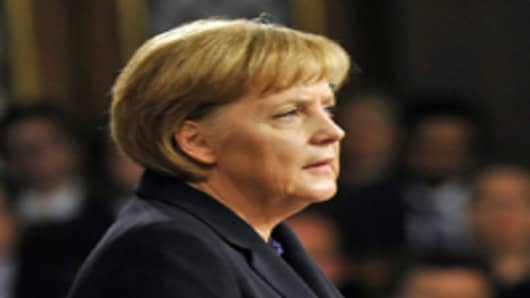The message from Germany is clear: there will be no bailout of the euro zone via monetizing debt through bond purchases by the European Central Bank. This stance, according to Chris Tinker, an equity strategist at Libra Investment Services in London, means higher borrowing costs acting as a mechanism for pushing through structural reforms.
The end game as far as Tinker is concerned is nothing short of re-molding Europe in Germany’s “Teutonic image.”
“The first evidence of this was when Greece was given a binary in or out of the EU option by France and Germany some weeks back. Any pretence that the EU and the Euro are operated on collegiate lines evaporated as Germany and France then demonstrated an unnervingly autocratic approach to their southern neighbors,” Tinker said in an interview with CNBC on Monday.
The major concern for Tinker is that this approach is being reinforced by an ECB “regime change,” where higher borrowing costs are used to enforce a technocratic solution to the crisis.
The current crisis is not, according to Tinker, a debt crisis but in fact a currency crisis where countries in Southern Europe face a competitiveness problem that is driving capital from their shores.
“There is no longer any reason for holding non-German exposurein the minds of many fixed income investors and, increasingly, equity marketsare following suit as prospects for economic demand dim further,” said Tinker, who believes devaluing the euro could be the answer to the problem.
“If we are prepared to think the unthinkable then it is Germany, not the rest of Europe that is actually the problem here, the solution is that the euro is the wrong price because it has Germany as a part of it,” Tinker added.
His answer is not to kick Greece or Italy out of the euro as some are suggesting but to make Germany leave the single currency and re-introduce the Deutsche Mark.
“It is not as if Germany needs the security of the ECB to support its domestic debt market or to provide liquidity to its banking system. Then allow the euro zone to devalue against all global currencies,” Tinker said.
This might be bad news for Germany’s exporters but would have a major benefit to the rest of the euro zone, which would be able to use devaluation to boost growth and lower debt levels.
“Interest rates will remain relatively high compared to 2010 levels, but given that yields already exceed those that predate the introduction of the euro for most participants, that is hardly the biggest downside,” said Tinker, who believes democracy could again dominate European decision making.
“The problems to such a proposal are not trivial but with the ECB/EU technocrats already driving reform in the Italian, Greek, Irish and Spanish economiesand with the IMF having also being lassoed into the process, the rest of Europe might just want to review the unthinkable and 'vote Germany out' of the euro,” he concluded.




